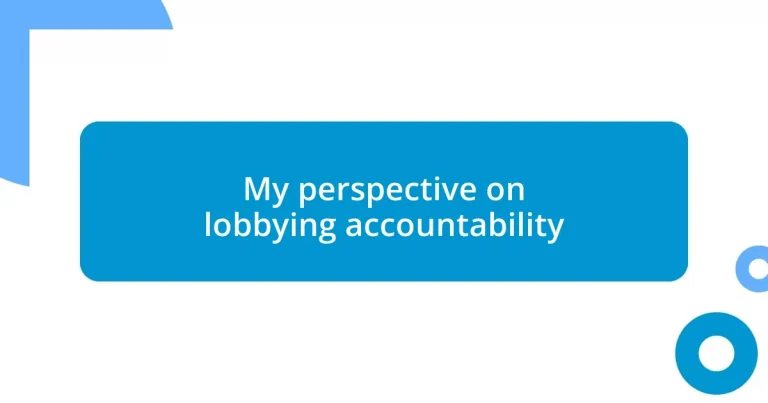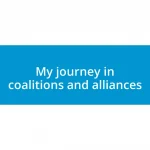Key takeaways:
- Effective lobbying accountability requires clear regulations to promote fairness and trust, enabling public voices to be heard.
- Transparency in lobbying is essential for reducing corruption, fostering community engagement, and ensuring informed decision-making.
- Key laws like the Lobbying Disclosure Act and the Honest Leadership and Open Government Act enhance accountability and visibility in lobbying activities.
- Best practices for lobbyists include open communication, continuous education, and a strong commitment to ethical decision-making, which can transform public perception and build trust.
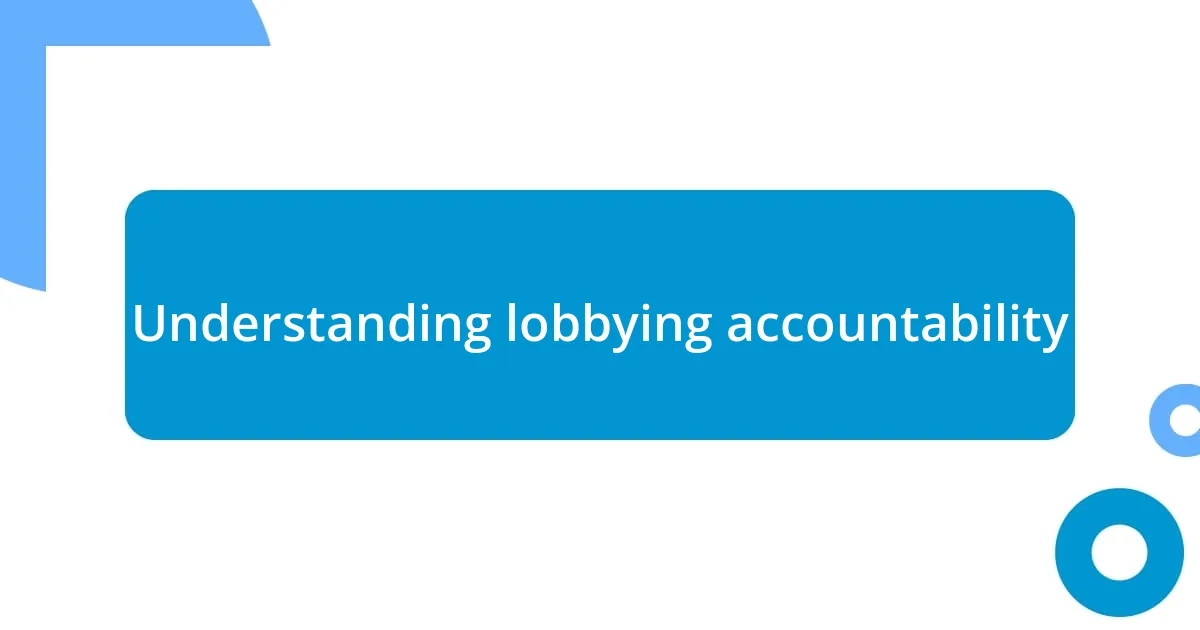
Understanding lobbying accountability
When I first began to delve into lobbying accountability, I was struck by how often this complex web of influences is shrouded in confusion. It dawned on me that accountability isn’t just about requiring transparency; it’s about fostering trust in a system that many view with skepticism. Have you ever wondered why some lobbyists seem more influential than others?
From my perspective, effective lobbying accountability requires robust regulations that provide clear guidelines on what is acceptable. I remember attending a local advocacy meeting where community members were frustrated, feeling their voices were drowned out by well-funded lobbyists. It made me realize the fine line between legitimate advocacy and undue influence, and how essential it is to establish measures that promote fairness and equity.
Another important aspect is the public’s role in holding lobbyists accountable. I often think about how much power we hold as engaged citizens. When we demand transparency and inquire about lobbying activities, we not only educate ourselves but also encourage policymakers to act responsibly. Ultimately, this creates a more balanced dialogue, ensuring that diverse voices are heard and considered in the decision-making process.
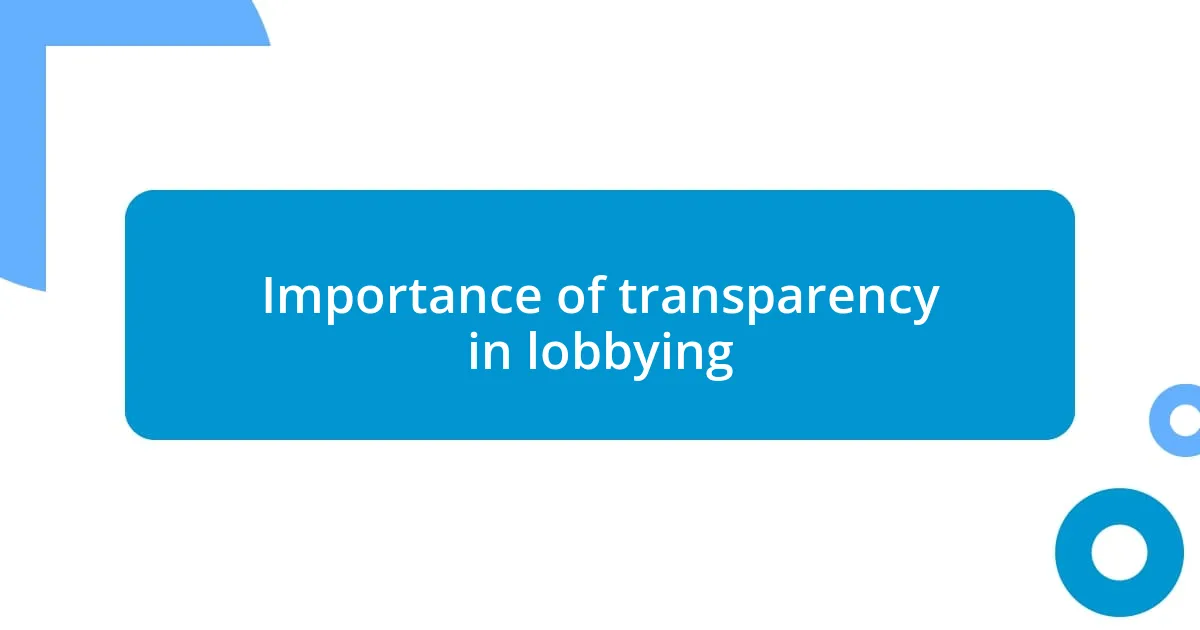
Importance of transparency in lobbying
Transparency in lobbying is fundamental to ensuring that the interests of the public aren’t overshadowed by powerful entities. I’ve found that when lobbying activities are open and disclosed, it diminishes the cloak of secrecy that often surrounds them. For instance, during a town hall meeting I attended, the community was much more engaged when they could see who was advocating for which policies. It not only spurred questions but also prompted a sense of empowerment among attendees.
Here are some key reasons why transparency is crucial in lobbying:
- Trust Building: Transparency helps cultivate trust between the public and policymakers, making it clear that decisions are made fairly.
- Reducing Corruption: Open lobbying practices can deter unethical behavior and corruption, as everything is out in the open.
- Engagement: When people know what is happening, they’re more likely to participate in discussions, bringing in diverse perspectives.
- Informed Decision-Making: Policy decisions benefit from a wider array of viewpoints, leading to more comprehensive solutions.
- Accountability: Public visibility encourages lobbyists to act responsibly, as their actions are subject to scrutiny.
Reflecting on these points reminds me of a campaign where transparency in lobbying led to community initiatives that genuinely mirrored the needs of the people rather than the interests of a few. It was heartening to witness how informed citizens voiced their concerns, ultimately swaying decisions. When transparency flourishes, it fosters a healthier democratic process.
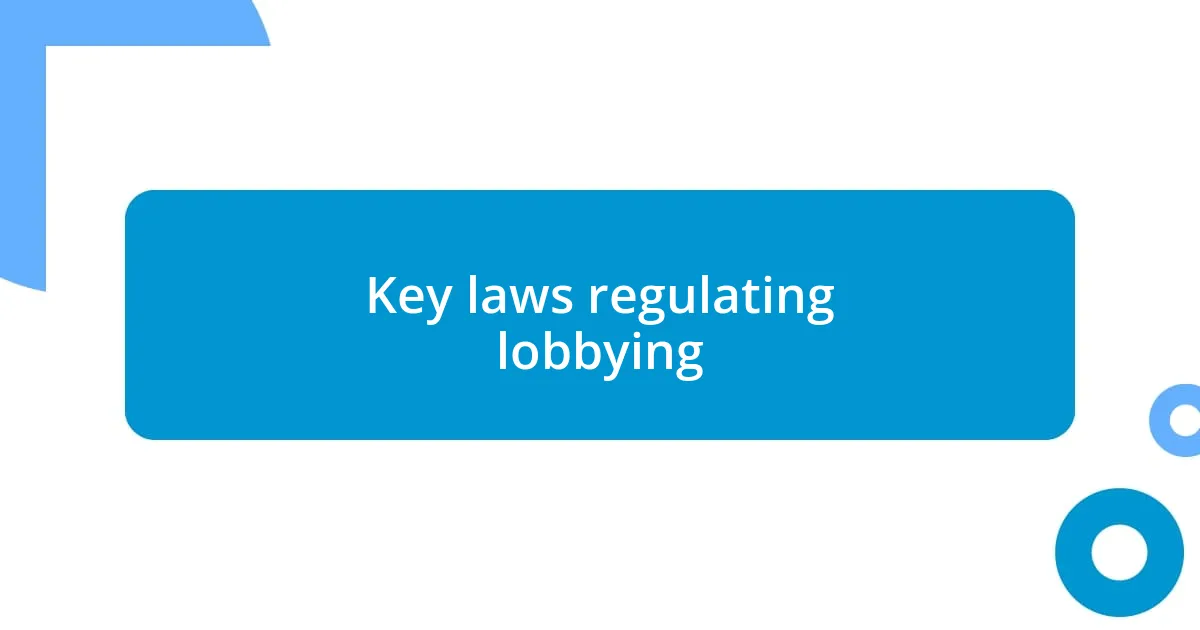
Key laws regulating lobbying
The landscape of lobbying is shaped significantly by a variety of laws designed to ensure accountability. In the United States, the Lobbying Disclosure Act (LDA) is a cornerstone piece of legislation. It mandates that lobbyists register and report their activities, shedding light on who is advocating for which interests. I remember learning about the LDA during a workshop, where the facilitators shared stories of grassroots movements that emerged in response to lobbying practices. It was enlightening to see how the LDA provided a framework that allowed citizens to scrutinize the actions of influential entities.
Another key regulation is the Foreign Agents Registration Act (FARA), which requires individuals acting as agents of foreign interests to disclose their relationships and activities. This law underscores the importance of keeping foreign influence transparent in U.S. policy-making. Reflecting on my own experiences, I recall an instance where a local news piece examined a foreign lobbying group’s impact on legislation. It sparked an invaluable community discussion about sovereignty and ethics, reinforcing the significance of such laws in holding all advocates to account.
Finally, the Honest Leadership and Open Government Act (HLOGA) builds on previous regulations by enhancing transparency requirements and prohibiting certain lobbying practices. I often think about how these laws evolve. In my opinion, constant vigilance and adaptation in regulations are crucial as the lobbying landscape changes. After all, when laws are too rigid, they may inadvertently allow ethical loopholes to proliferate, leading to a cycle of distrust.
| Law | Key Features |
|---|---|
| Lobbying Disclosure Act (LDA) | Mandates lobbyist registration and activity reporting. |
| Foreign Agents Registration Act (FARA) | Requires disclosure of foreign interests in lobbying. |
| Honest Leadership and Open Government Act (HLOGA) | Enhances transparency and prohibits certain practices. |
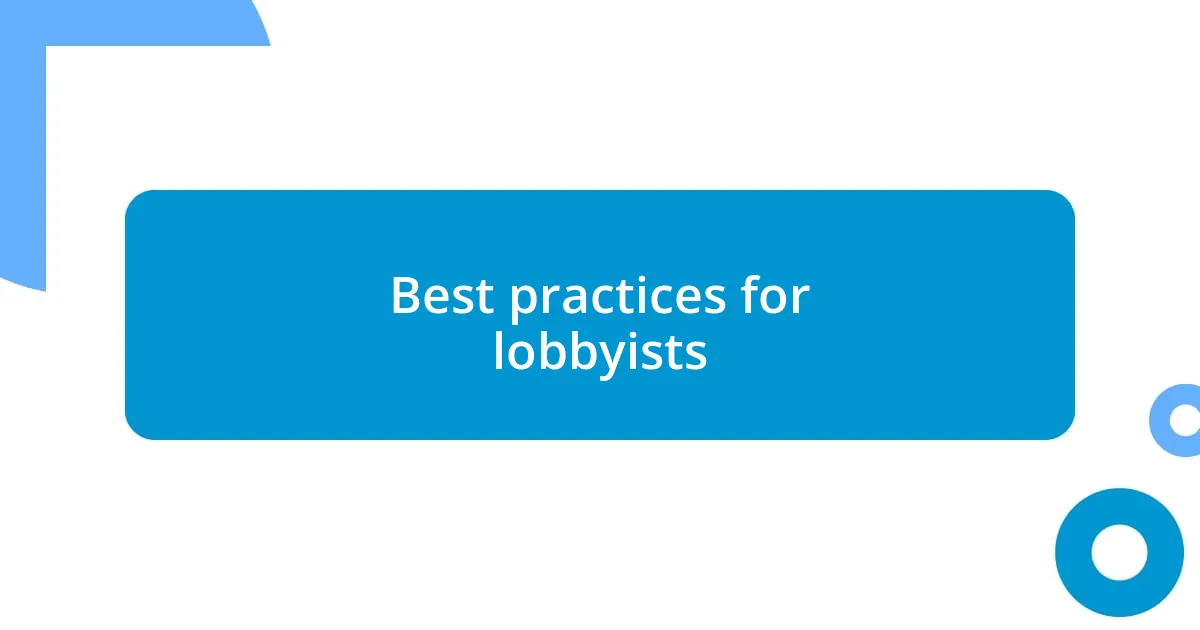
Best practices for lobbyists
Lobbyists can adopt best practices that not only enhance their effectiveness but also align with ethical standards. One essential practice is maintaining open lines of communication with stakeholders. I remember a meeting where a lobbyist took the time to explain the intricacies of a proposed law to concerned citizens. This kind of engagement transforms skepticism into trust and fosters a collaborative environment. Have you ever felt more at ease when someone took the time to listen and explain instead of just pushing their agenda? That’s the power of connection in lobbying.
Another effective strategy involves continuously educating oneself about both the legislative landscape and the communities involved. This deep understanding allows lobbyists to represent their interests authentically and adapt to changing circumstances. In my own journey, I’ve found that attending local forums, much like a conference I once went to, creates opportunities to gather unique perspectives. It’s not just about knowing policy; it’s about grasping the heartbeat of the community, something I wish more lobbyists pursued. How can we expect others to understand our motivations if we don’t first seek to understand theirs?
Lastly, ethical decision-making should be at the forefront of all lobbying activities. Upholding integrity is crucial. I’ve seen firsthand how a commitment to ethical practices differentiates sincere lobbying from mere influence peddling. Reflecting on a past experience where a lobbyist declined an offer they deemed unethical really struck me. It brought about respect and admiration from those around them. Would you trust someone who folds under pressure, or someone who stands firm for their values? The choice seems clear, doesn’t it? Upholding ethical standards can ultimately lead to sustainable influence and a stronger reputation in the long run.
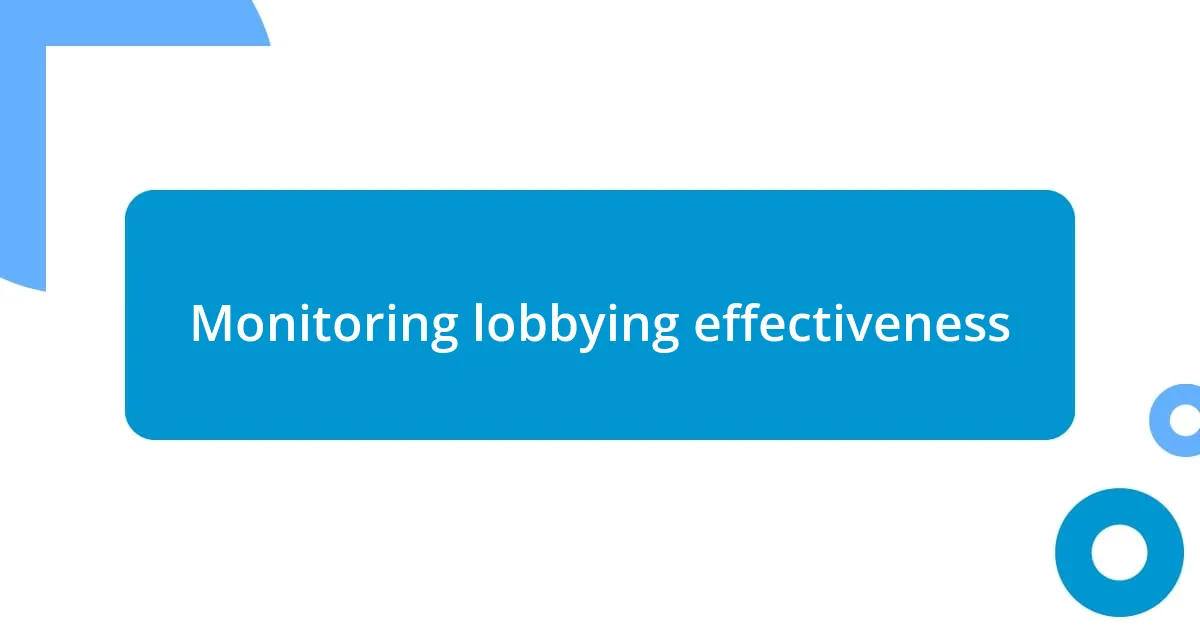
Monitoring lobbying effectiveness
Monitoring lobbying effectiveness is crucial for ensuring that the interests being advocated truly align with public needs. From my experience, effective monitoring should not just be about tracking who is lobbying but also understanding the outcomes of those efforts. I once attended a forum where a panelist presented statistics on legislation influenced by lobbyists, and I was amazed at how much impact informed oversight can have on the entire process. Wouldn’t it be fascinating to see how different lobbying strategies fare against one another over time?
The use of metrics and performance indicators can also significantly enhance how we assess lobbying efforts. I’ve seen organizations leverage specific benchmarks—like changes in policy or public sentiment—after lobbying campaigns to evaluate effectiveness. This approach tells a compelling story about the influence of advocacy in shaping laws and policies. It resonates with me because it combines both tangible results and the narrative of engagement, which ultimately fosters more informed discussions around lobbying.
What truly stands out to me are the forums and public reports that emerge from proactive monitoring. I’ve witnessed communities come together to dissect lobbying activities, shining a spotlight on practices that seem questionable. In these discussions, I’ve felt the palpable change in the room—knowledge breeds empowerment. Have you ever participated in a dialogue that made you rethink your position? It’s exhilarating to watch constituents holding lobbyists accountable, turning the tables on the power dynamics at play and reinforcing the idea that transparency elevates everyone’s voice.
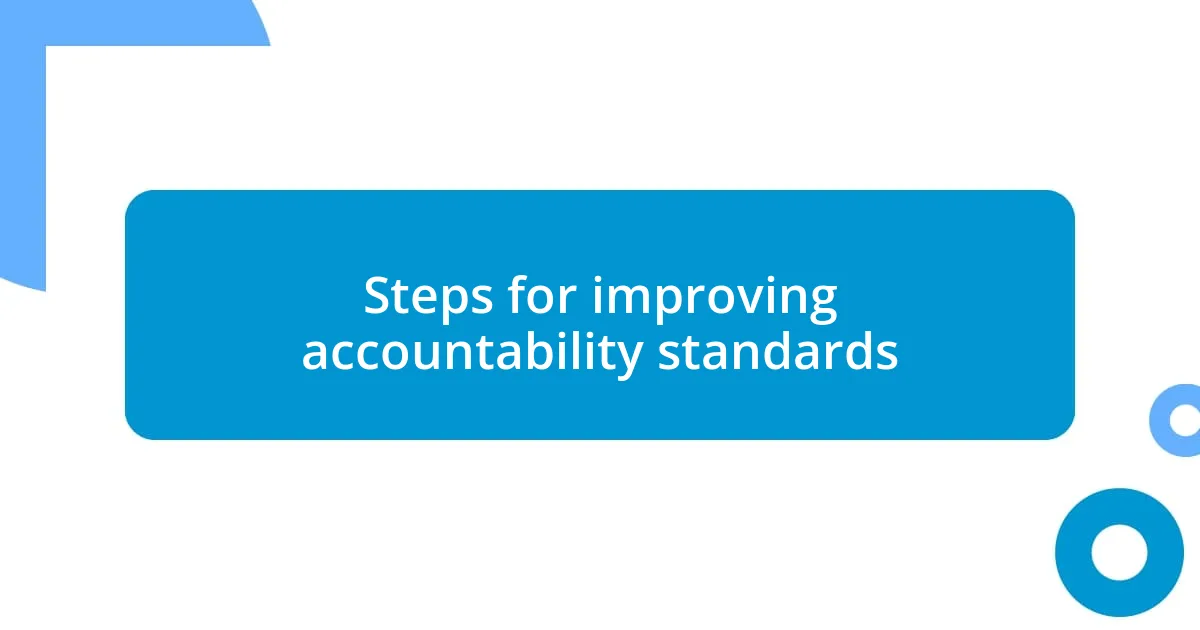
Steps for improving accountability standards
Improving accountability standards requires a concerted effort towards transparency in lobbying practices. I remember a time when a grassroots campaign invited lobbyists to publicly share their strategies and objectives. The openness in that atmosphere was striking. Would you believe how many misconceptions were cleared up just by fostering an environment of transparency? It showed me that when lobbyists step out of the shadows and embrace open dialogue, it can dispel distrust and build a stronger rapport with the community.
Implementing regular audits can further enhance accountability. During my early career, I witnessed a nonprofit organization initiate quarterly reviews of their lobbying activities. This really drove home the idea that accountability isn’t just a box to check; it’s a continuous commitment to improvement. Can you imagine the shift in culture when the focus moves from merely meeting regulatory requirements to fostering genuine responsibility? It creates an atmosphere where ethical practices thrive.
Lastly, creating standards for ethical lobbying can be a game-changer. I once participated in a workshop where we developed a code of conduct for lobbyists, discussing real-life scenarios that might challenge our values. Those discussions ignited passion among the participants, as we all had varying experiences that informed our understanding of ethics. What struck me most was the realization that a unified ethical framework not only guides decision-making but also empowers lobbyists to hold each other accountable. Doesn’t it feel reassuring to know you have a community standing by your values? Improving accountability standards is not just about rules; it’s about building trust within a network striving for positive change.












